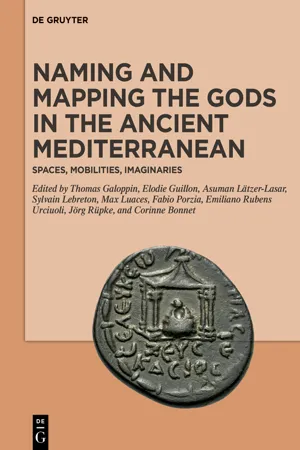
Naming and Mapping the Gods in the Ancient Mediterranean
Spaces, Mobilities, Imaginaries
- 1,089 pages
- English
- ePUB (mobile friendly)
- Available on iOS & Android
Naming and Mapping the Gods in the Ancient Mediterranean
Spaces, Mobilities, Imaginaries
About this book
Ancient religions are definitely complex systems of gods, which resist our understanding. Divine names provide fundamental keys to gain access to the multiples ways gods were conceived, characterized, and organized. Among the names given to the gods many of them refer to spaces: cities, landscapes, sanctuaries, houses, cosmic elements. They reflect mental maps which need to be explored in order to gain new knowledge on both the structure of the pantheons and the human agency in the cultic dimension. By considering the intersection between naming and mapping, this book opens up new perspectives on how tradition and innovation, appropriation and creation play a role in the making of polytheistic and monotheistic religions.
Far from being confined to sanctuaries, in fact, gods dwell in human environments in multiple ways. They move into imaginary spaces and explore the cosmos. By proposing a new and interdiciplinary angle of approach, which involves texts, images, spatial and archeaeological data, this book sheds light on ritual practices and representations of gods in the whole Mediterranean, from Italy to Mesopotamia, from Greece to North Africa and Egypt. Names and spaces enable to better define, differentiate, and connect gods.
Frequently asked questions
- Essential is ideal for learners and professionals who enjoy exploring a wide range of subjects. Access the Essential Library with 800,000+ trusted titles and best-sellers across business, personal growth, and the humanities. Includes unlimited reading time and Standard Read Aloud voice.
- Complete: Perfect for advanced learners and researchers needing full, unrestricted access. Unlock 1.4M+ books across hundreds of subjects, including academic and specialized titles. The Complete Plan also includes advanced features like Premium Read Aloud and Research Assistant.
Please note we cannot support devices running on iOS 13 and Android 7 or earlier. Learn more about using the app.
Information
Table of contents
- Title Page
- Copyright
- Contents
- Introduction Exploring the Intersection between Divine Names and Places
- 1 Naming and Locating the Gods: Space as a Divine Onomastic Attribute
- 1.1 Egypt and Near East
- 1.2 Greece: Literature
- 1.3 Greece: Local and Regional Approaches
- 1.4 Rome and the West
- 2 Mapping the Divine: Presenting Gods in Space
- 2.1 Egypt and Near East
- 2.2 Phoenician and Punic World
- 2.3 Archaic and Classical Greece
- 2.4 Rome and its Empire
- 3 Gods and Cities: Urban Religion, Sanctuaries and the Emergence of Towns
- 3.1 Egypt and Near East
- 3.2 Greek World
- 3.3 Rome and the West
- Epilogue
- Index Nominum